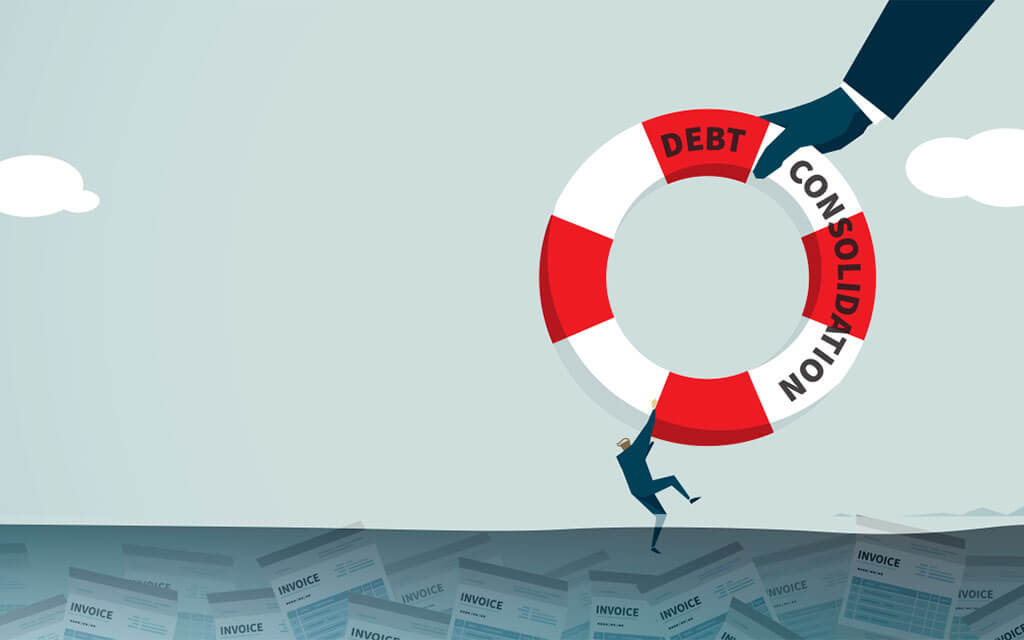
Navigating the financial landscape can be particularly challenging for small businesses, especially when juggling multiple debts.
Small business debt consolidation emerges as a strategic solution that simplifies repayment and can enhance cash flow. This article breaks down what debt consolidation is, how it works, and its specific advantages and risks for small businesses.
It also guides you through the qualification criteria, the types of loans available, and important factors to consider when choosing the right option. Learn how to effectively manage your finances post-consolidation and set your business on the path to financial stability.
Key Takeaways:
- Debt consolidation combines multiple debts into one, simplifying payments and potentially reducing interest rates.
- Small businesses can benefit from debt consolidation by improving cash flow and reducing overall debt burden.
- When considering debt consolidation, it is important to compare options and carefully assess risks and requirements before applying.
What Is Debt Consolidation?
Debt consolidation is a financial strategy that allows individuals and businesses to combine multiple debts into a single loan, making it easier to manage monthly payments and potentially lowering interest rates. For small businesses, this method can improve cash flow, streamline financial management, and provide a pathway to debt relief. By consolidating debts, business owners can prioritize their financial health while simplifying their debt repayment process, which is crucial for sustaining operations and achieving growth.
How Does Debt Consolidation Work?
Debt consolidation works by allowing borrowers to take out a new loan that pays off existing debts, with the goal of simplifying payments into a single monthly obligation.
This method can greatly ease financial stress, particularly when managing multiple creditors and varying interest rates. A key first step is to calculate existing debts, which involves listing all outstanding balances, interest rates, and monthly payments. Once a total amount is determined, individuals can explore their options for obtaining a loan.
Next comes the application process. Borrowers should gather essential documentation, such as:
- Recent pay stubs
- Tax returns
- Bank statements
- A comprehensive list of debts
Once submitted, lenders review these documents to assess creditworthiness and may offer various types of loans suitable for consolidation. It’s important to understand how each type of financing can impact overall financial health since different loans may come with varying terms and conditions.
Why Do Small Businesses Need Debt Consolidation?
Small businesses often face unique financial challenges, including juggling multiple debts from credit cards, lines of credit, and business loans, which is why debt consolidation can be a vital tool for maintaining financial stability. By consolidating debts, business owners can significantly improve their cash flow, enhance their credit score over time, and reduce the burden of high-interest rates, thereby allowing them to focus on growth and profitability.
What Are The Benefits Of Debt Consolidation For Small Businesses?
The benefits of debt consolidation for small businesses include simplified monthly payments, lower overall interest rates, and improved cash flow, which can free up resources for essential operations and growth. By consolidating multiple debts into a single loan, small business owners can streamline their financial management and create a more predictable budgeting process.
Many entrepreneurs find that these changes can significantly improve their operational efficiency. With reduced monthly payments often resulting from lower interest rates, businesses can allocate funds more effectively.
- For instance, studies indicate that business owners who consolidate their debts often see an improvement in cash flow by as much as 20%.
- This newfound financial flexibility can give the power to owners to reinvest in critical areas, such as marketing or inventory, enhancing potential revenue.
- As noted by financial expert Viridiana Ponce, “Debt consolidation can drastically reduce the psychological burden of multiple payments, allowing business owners to focus on growth rather than stress.”
Statistics show that companies that manage their debt effectively report higher satisfaction and less anxiety over their financial situation.
The process of debt consolidation is not just a financial strategy; it is also a pathway to a more manageable and productive business environment.
What Are The Risks Of Debt Consolidation For Small Businesses?
While debt consolidation can offer various benefits for small businesses, it is not without risks, including the potential for increased debt levels if not managed properly and the impact on the credit score if payments are missed. Business owners must carefully consider the terms of consolidation loans and the reliability of financial institutions before proceeding.
In fact, without a clear understanding, borrowers can easily fall into a cycle of escalating debt that complicates their financial situation even further.
According to Equifax, it’s vital for business owners to dissect the loan terms thoroughly, ensuring they understand the interest rates, fees, and any penalties for early repayment. Misunderstanding these details can lead to unexpected costs, which worsen the situation.
TransUnion warns that missed payments on consolidation loans can significantly damage credit scores, making it harder to secure financing in the future. Hence, potential borrowers should also consult resources from Experian regarding the impact such decisions can have on their overall financial health.
- Potential to fall into further debt.
- Misunderstanding loan terms.
- Negative effects on credit scores.
How To Qualify For Debt Consolidation As A Small Business?
Qualifying for debt consolidation as a small business typically involves assessing your current financial situation, including outstanding debts, credit scores, and overall cash flow, and then demonstrating this information to lenders. It’s essential to have proper documentation, such as financial statements and credit reports, to support your application and enhance your chances of approval.
What Are The Requirements For Debt Consolidation?
The requirements for obtaining debt consolidation for small businesses vary by lender but generally include a good credit score, proof of revenue, and a clear repayment strategy for existing debts.
Lenders assess these factors diligently to gauge the risk associated with providing consolidation options. For instance, a credit score of at least 650 is often necessary, as this score reflects the business’s reliability and creditworthiness.
Potential borrowers must present detailed financial statements, ideally showcasing consistent revenue over the past year, to ensure they can handle future repayments.
Documentation such as tax returns and bank statements plays a crucial role during the application process. Lenders like Funding Circle utilize these metrics not just to determine eligibility but also to tailor their offers to match the specific needs of businesses.
By understanding the overall financial situation, they can provide a more effective debt consolidation solution that minimizes both risk for the lender and financial strain for the borrower.
What Are The Different Types Of Debt Consolidation Loans?
There are various types of debt consolidation loans available for small businesses, including personal loans, business lines of credit, and government-backed options like SBA 7(a) loans, each offering unique terms and benefits. Choosing the right type of loan depends on the specific financial needs and existing debts of the business.
Small business owners should consider several factors when selecting a debt consolidation loan, as each option comes with its distinct advantages and challenges. For instance, personal loans can be easier to obtain and may offer lower interest rates; however, they often require personal guarantees, exposing owners to greater risk. In contrast, business lines of credit provide flexibility, allowing businesses to borrow and repay as needed, though they may come with higher fees and fluctuating interest rates.
- Benefits: Improved cash flow, simplified payments, and potentially lower interest rates.
- Drawbacks: Risk of accumulating more debt, fees associated with loans, and variable terms depending on creditworthiness.
The role of lenders is crucial in this process, as they assess the financial health of the business and determine the appropriate loan terms. To ensure they select the best option, businesses should evaluate their current debts, revenue, and future financial projections to make informed decisions.
How To Choose The Right Debt Consolidation Option For Your Small Business?
Choosing the right debt consolidation option for your small business involves evaluating your financial situation, understanding your debt load, and comparing interest rates and terms offered by various lenders. Taking the time to research and analyze different options will lead to a more informed decision that can significantly impact your business’s financial health.
What Are The Factors To Consider When Choosing A Debt Consolidation Loan?
When choosing a debt consolidation loan for a small business, several factors must be considered, including interest rates, monthly payments, loan terms, and the reputation of lenders. These factors can greatly influence the overall cost of borrowing and the ease of managing payments over time, ultimately affecting the business’s ability to invest in growth opportunities and maintain cash flow stability.
First and foremost, interest rates play a pivotal role in determining the affordability of the loan. A lower rate means reduced monthly payments, which can free up essential capital for daily operations. For example, if a small business with $50,000 in debt manages to consolidate at a lower interest rate from 10% to 6%, the savings on interest payments can be significant over time.
Next, the loan terms must be scrutinized. This includes the duration of repayment, which can impact cash flow. Shorter terms often come with higher monthly payments, while longer terms might result in a lower monthly burden but can lead to paying more interest cumulatively.
The reputation of lenders should not be overlooked. Selecting a lender with a solid track record can ensure a smoother experience and potentially better terms. Researching reviews or seeking recommendations can help pinpoint trustworthy sources.
How To Compare Different Debt Consolidation Options?
To effectively compare different debt consolidation options for a small business, it’s important to assess interest rates, loan terms, and the documentation required by various lenders. This evaluation will help business owners identify the most suitable option that aligns with their financial goals and repayment capabilities.
To do this comprehensively, one should create a checklist that includes key criteria such as the lender’s reputation, customer service, and flexibility in repayment plans. Understanding the total cost associated with each option, including any hidden fees or penalties, is crucial. By calculating the overall repayment amount over the loan’s duration, you can better ascertain which option minimizes financial strain.
- Step 1: Research and compile a list of potential lenders.
- Step 2: Rate them based on interest rates and terms.
- Step 3: Evaluate their requirements for documentation, ensuring you meet their standards.
- Step 4: Use your checklist to compare and contrast options based on qualitative factors.
- Step 5: Align the chosen debt consolidation strategy with the overall business plan to ensure long-term viability and success.
What Is The Process Of Applying For A Debt Consolidation Loan?
The process of applying for a debt consolidation loan typically involves researching lenders, completing an application, and submitting necessary documentation to assess your financial situation and debt load. Each lender may have different requirements, so understanding the specific steps involved is crucial for a successful application.
What Documents Are Needed For The Application?
When applying for a debt consolidation loan, several key documents are typically required, including financial statements, business plans, and recent credit reports from agencies like Experian, Equifax, and TransUnion. These documents provide lenders with a comprehensive understanding of the business’s financial health and repayment capability.
Along with these crucial papers, applicants might also need to submit tax returns, proof of income, and bank statements. Each of these documents plays a vital role in demonstrating an individual’s or business’s overall financial situation.
- Tax Returns: Offering a glimpse into past earnings, these are essential for verifying income stability.
- Proof of Income: Pay stubs or other proof sources reassure lenders of the applicant’s ability to maintain regular payments.
- Bank Statements: These illustrate cash flow and spending habits, contributing to a complete financial picture.
To enhance the chances of a successful application, it’s advisable to organize these documents in a clear and logical manner. Utilizing a binder, categorizing documents, and ensuring everything is current and accurate can make a significant difference when presenting the application to lenders.
How Long Does It Take To Get Approved For A Debt Consolidation Loan?
The time it takes to get approved for a debt consolidation loan can vary significantly depending on the lender and the complexity of the application, ranging from a few days to several weeks. Understanding the factors affecting approval time can help business owners better prepare and set realistic expectations.
Many aspects can drastically influence how quickly a borrower receives approval for a loan. Generally, a lender will consider the completeness of the application, the borrower’s credit score, and their financial history. It’s also essential to have a well-organized set of documents ready to submit. In some situations, providing additional information or clarifying points can expedite the review process.
- Factors that may speed up the process:
- Submitting a comprehensive application with all required documents.
- Having a strong credit score.
- Utilizing a lender with a streamlined application process.
On the other hand, delays can occur due to missing documents, lower credit scores, or high loan amounts compared to the borrower’s income. Lenders often share insights, revealing that a well-prepared application can lead to faster processing times, ideally within a week. By being proactive and following these best practices, borrowers can improve their chances of quick loan approvals.

What Happens After You Are Approved For A Debt Consolidation Loan?
After being approved for a debt consolidation loan, small businesses can start to manage their finances more efficiently, as they will typically experience improved cash flow and simplified monthly payments. This new financial structure allows business owners to focus on growing their operations rather than stressing over multiple debts.
How To Manage Your Finances After Consolidating Your Debts?
Managing your finances after consolidating debts is crucial for maintaining stability and ensuring that the benefits of debt consolidation, like improved cash flow and reduced monthly payments, are fully realized. Business owners should consider utilizing financial consultants to help create effective budgeting strategies and monitor ongoing financial health.
A solid approach begins with developing a comprehensive
- budgeting plan
- tracking expenses regularly
- establishing emergency savings
to cushion against any unforeseen costs.
In addition, leveraging financial consulting services can provide invaluable insights into investment opportunities and alternative funding options, allowing businesses to make informed decisions.
Owners are encouraged to prioritize ongoing financial education, attending workshops and webinars, to equip themselves with tools that help prevent future debt issues.
This proactive attitude fosters sustainability and can significantly contribute to long-term growth.
Frequently Asked Questions
What is debt consolidation for small businesses?
Debt consolidation for small businesses is a financial strategy that involves combining multiple debts into one loan, usually with a lower interest rate and monthly payment. This can make it easier for small businesses to manage and pay off their debts.
Why should small businesses consider debt consolidation?
Small businesses should consider debt consolidation because it can help them streamline their finances and potentially save money on interest. It can also make it easier to manage debt and avoid missed payments.
What types of debts can be consolidated for small businesses?
Small businesses can consolidate various types of debts, including credit card debt, business loans, and merchant cash advances. It’s important to carefully evaluate all debts and their interest rates before deciding to consolidate.
How does debt consolidation for small businesses work?
In debt consolidation, a small business takes out a new loan to pay off all of their existing debts. This leaves them with just one loan, one monthly payment, and potentially a lower interest rate. The new loan can be obtained through a bank, credit union, or online lender.
What are the potential benefits of debt consolidation for small businesses?
Debt consolidation can offer several benefits for small businesses, including simplified finances, lower interest rates, and potentially improved credit scores. It can also help small businesses avoid bankruptcy or other financial difficulties.
What are the potential risks of debt consolidation for small businesses?
While debt consolidation can be a helpful financial tool, it’s important for small businesses to carefully consider the risks. These can include additional fees and interest charges, as well as the potential for damage to credit if the new loan is not managed properly.




